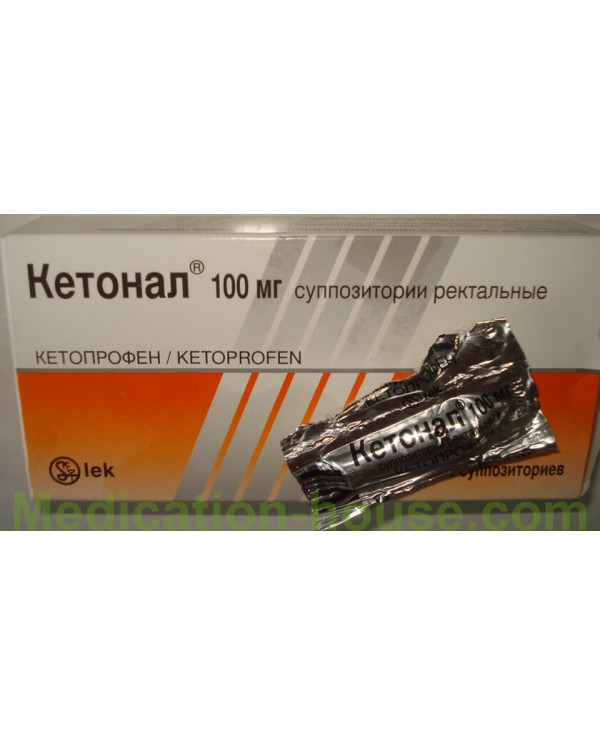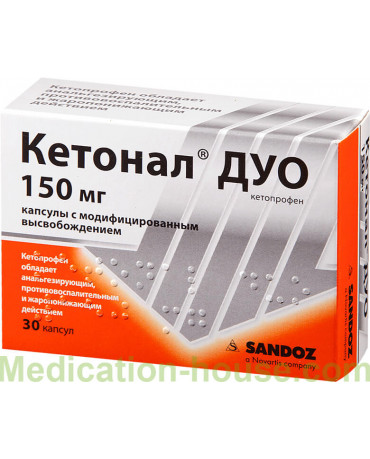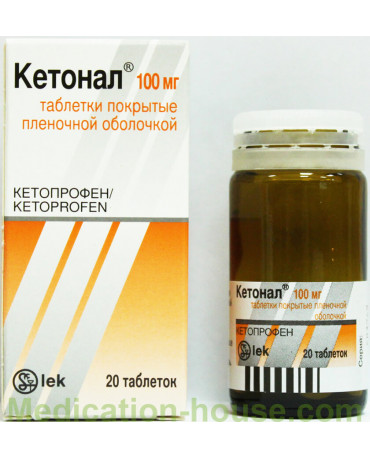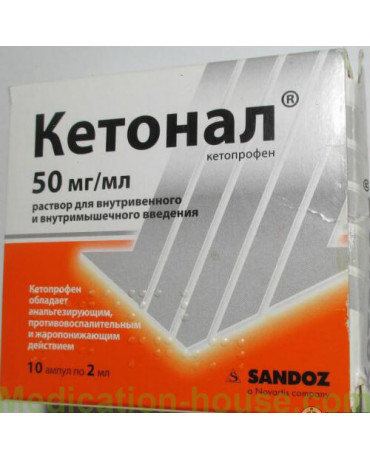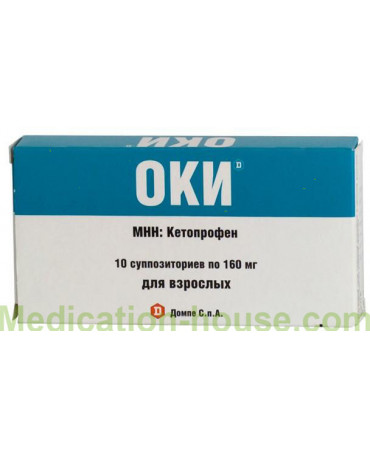Ketonal suppositories user manual
To buy Ketonal suppositories just add it to your shopping cart
Release form, composition
The drug is produced in the form of rectal suppositories with white color, uniform structure and smooth surface.
Each suppository contains ketoprofen in the amount of 100 mg.
As an additional component, glyceryl caprilocaprate and solid fat are used.
Each carton pack contains 2 strips containing 6 suppositories.
Pharmacological properties
The active ingredient of Ketonal suppositories exhibits analgesic, antipyretic effects and inhibits inflammatory processes. Also, the main compound of Ketonal suppositories reduces the production of bradykinin and prostaglandin, strengthens the membrane of lysosomes.
The highest amount of ketoprofen in the blood is observed 1.5 hours after using rectal suppositories.
Most of Ketonal suppositories is excreted from the body with the help of the liver. In patients with renal insufficiency, the period of excretion of the active component is delayed, therefore, this category of patients needs to adjust the dosage.
Indications for use
Ketonal suppositories is prescribed for the symptomatic treatment of diseases that are accompanied by an inflammatory process, for example, the treatment of degenerative and inflammatory diseases of the musculoskeletal system:
Pseudogout, gouty arthritis;
Rheumatoid arthritis;
Seronegative arthritis (Reiter's syndrome, ankylosing spondylitis, psoriatic arthritis);
Osteoarthritis.
Also, Ketonal suppositories is prescribed for the symptomatic treatment of diseases involving pain:
Algomenorrhea;
Radiculitis, neuralgia, myalgia;
Headache;
Pain in cancer;
Pain after trauma and surgery;
Extraarticular rheumatism (inflammatory process in the periarticular tissues, bursitis, tendonitis).
Dosing regimen
Adult patients are prescribed 1 suppository twice per day.
This dosage form of Ketonal suppositories is allowed to combine with other medicines, containing ketoprofen in its composition for both external and systemic use. The highest amount of ketoprofen that can be taken per day is 200 mg.
Overdose
When using ketoprofen, in a dosage exceeding 2.5 g, signs of overdose may appear. More often, these symptoms are easily tolerated by the patient and are limited to painful sensations in the abdomen, vomiting, drowsiness, and nausea.
Since there are no antidotes for preparations containing ketoprofen, treatment for poisoning with medication is carried out by gastric lavage. Supportive and symptomatic therapy is also prescribed to compensate for dehydration. Patients suffering from renal insufficiency are given hemodialysis so that the medicinal substance is completely removed from the blood.
Drug interactions
The main component of Ketonal suppositories weakens the effectiveness of antihypertensive drugs and diuretics, and increases the effectiveness of hypoglycemic agents (oral administration), as well as some drugs that relieve seizures (for example, phenytoin).
Significantly increases the likelihood of gastrointestinal diseases in parallel with other NSAIDs, salicylates, ethyl alcohol and GCS.
The likelihood of bleeding in the case of joint use of Ketonal suppositories with antiplatelet agents, thrombolytics and anticoagulants increases.
Simultaneous use of Ketonal suppositories with ACE inhibitors and diuretics may lead to a risk of renal impairment.
Joint admission leads to an increase in blood levels of drugs such as cyclosporine, calcium channel blockers, methotrexate, drugs with lithium, cardiac glycosides.
Ketoprofen is able to lower the effect of mifepristone. Therefore, medication should be started no earlier than 12 days after the end of the use of mifepristone.
The chance of bleeding increases with a combination of pentoxifylline. With this combination requires frequent monitoring of clinical indicators.
Simultaneous intake of probenecid may reduce the rate of clearance of the main component of Ketonal suppositories - ketoprofen.
Lactation and pregnancy
Ketonal suppositories should not be taken by patients on the 3rd trimester of pregnancy. It is possible to prescribe Ketonal suppositories on the 1st and 2nd trimester only when the required benefit of treatment far exceeds the possible risk to the mother and fetus.
There is no evidence that ketoprofen is excreted in breast milk. Therefore, if there is a need for long-term treatment with this medicine, breastfeeding should be stopped.
Side effects
The use of drugs can lead to the development of the following adverse reactions:
Urinary system: nephrotic syndrome, renal failure in the acute stage;
Biliary tract and liver: hepatitis, against the background of this disease may increase the amount of transaminases and bilirubin in the blood;
Respiratory system: rhinitis, asthma, bronchospasm in patients with high sensitivity to NSAIDs;
Sense organs: conjunctivitis, tinnitus, blurred vision;
Mental changes: dysphoria;
Lymphatic system and blood: thrombocytopenia, purpura, pancytopenia, agranulocytosis, hemorrhagic anemia;
Common manifestations: fatigue, weight gain, swelling;
Subcutaneous tissue and skin: bullous rash (epidermal necrolysis with toxic manifestations and Stevens-Johnson syndrome), urticaria, photosensitivity, rash, angioedema, alopecia, pruritus;
Gastrointestinal tract: gastrointestinal bleeding, peptic ulcers, gastritis, diarrhea, dry mouth, abdominal pain, dyspeptic manifestations, Crohn's disease, colitis, stomatitis, flatulence, constipation, vomiting, nausea;
Cardiovascular system: increased blood pressure, heart failure, vasodilation, tachycardia;
Nervous system: convulsions, increased or decreased appetite, dizziness, dysgeusia, paresthesias, drowsiness, headache;
Immune system: anaphylactic manifestations;
Use of rectal suppositories can lead to local undesirable manifestations in the form of irritation of mucous membranes, loose stools and burning sensation.
Contraindications
Ketonal suppositories can not be prescribed in the following situations:
Lactation;
Age under 15;
Chronic dyspepsia;
The period after surgery (coronary artery bypass surgery);
Renal disease in a progressive stage;
Hepatic insufficiency severely;
Crohn's disease;
Spasm of the bronchi, rhinitis, asthma, bronchial, urticaria, caused by the use of salicylates;
High sensitivity to any component of the medication;
3 trimester of pregnancy;
Bleeding in the intestine or diseases of the direct intestine, accompanied by inflammation;
Cerebrovascular or gastrointestinal bleeding;
Uncompensated heart failure;
Renal failure in severe form;
Changes in blood clotting and hemophilia;
Exacerbation of duodenal or gastric ulcers;
special instructions for Ketonal suppositories
Elderly patients suffering from chronic kidney disease, being treated with diuretics, having nephrosis, cirrhosis or heart failure, must monitor the condition of the kidneys, liver and blood during therapy with NSAIDs. Since ketoprofen has a depressant effect on prostaglandins, such treatment can provoke a decrease in blood flow to the kidneys, which will worsen the further functioning of this organ.
Patients with high blood pressure or with diseases of the cardiovascular system, leading to excessive fluid retention, should often monitor the level of blood pressure.
Like any other NSAIDs, ketoprofen can mask the symptoms of infectious diseases.
Patients suffering from nasal polyposis, sinusitis or rhinitis in the chronic stage, as well as bronchial asthma, are more susceptible to allergic manifestations on NSAIDs. Therefore, in this category of patients increases the likelihood of an attack.
Patients who are planning a pregnancy, it is advisable not to take Ketonal suppositories, because it reduces the possibility of implantation of the egg.
If a rash appears on the skin, mucous membranes, or other symptoms of high sensitivity, Ketonal suppositories should be immediately discontinued.
Therapy should be discontinued when the vision is changed, even if it is not clear.
If during the treatment with this drug the patient found such side effects as dizziness or drowsiness, it is not recommended to drive a car or do work that requires high attention and quick reactions.
Terms and conditions of storage
Ketonal suppositories is stored at a temperature of not more than 25 grams in a place remote from children. The drug is allowed to use within 5 years from the date of its release.
Terms of sell
You don't need a prescription to buy Ketonal suppositories.

